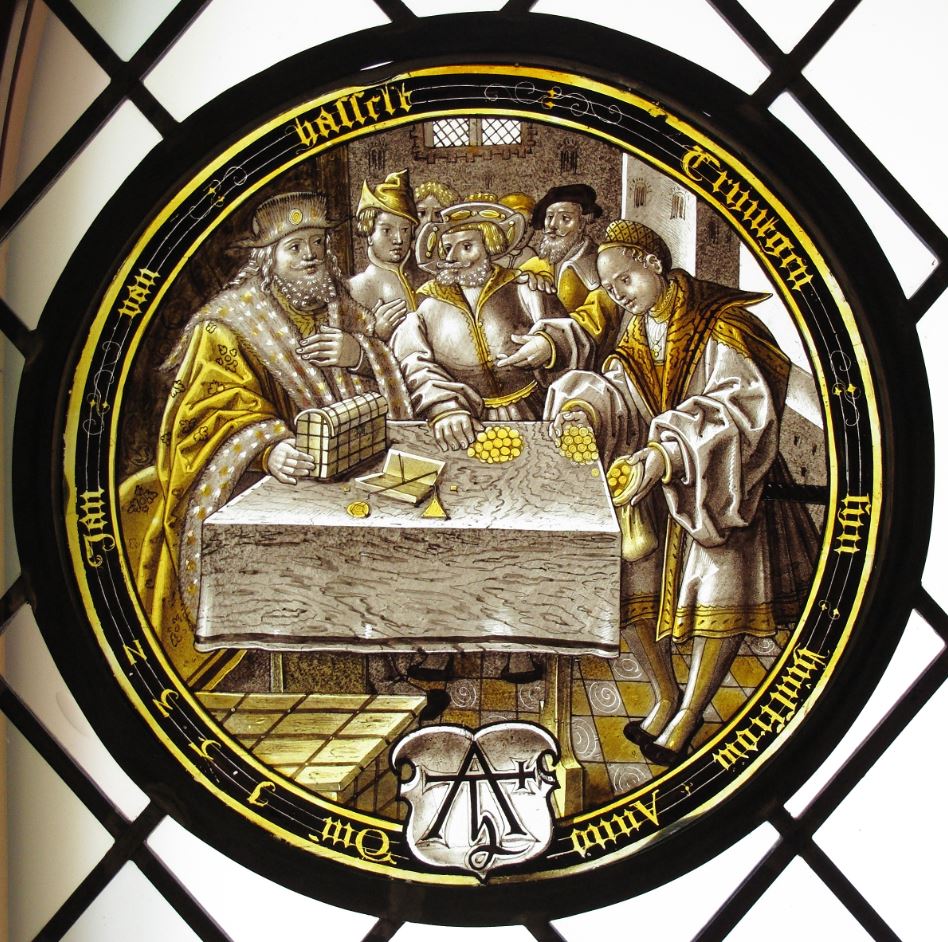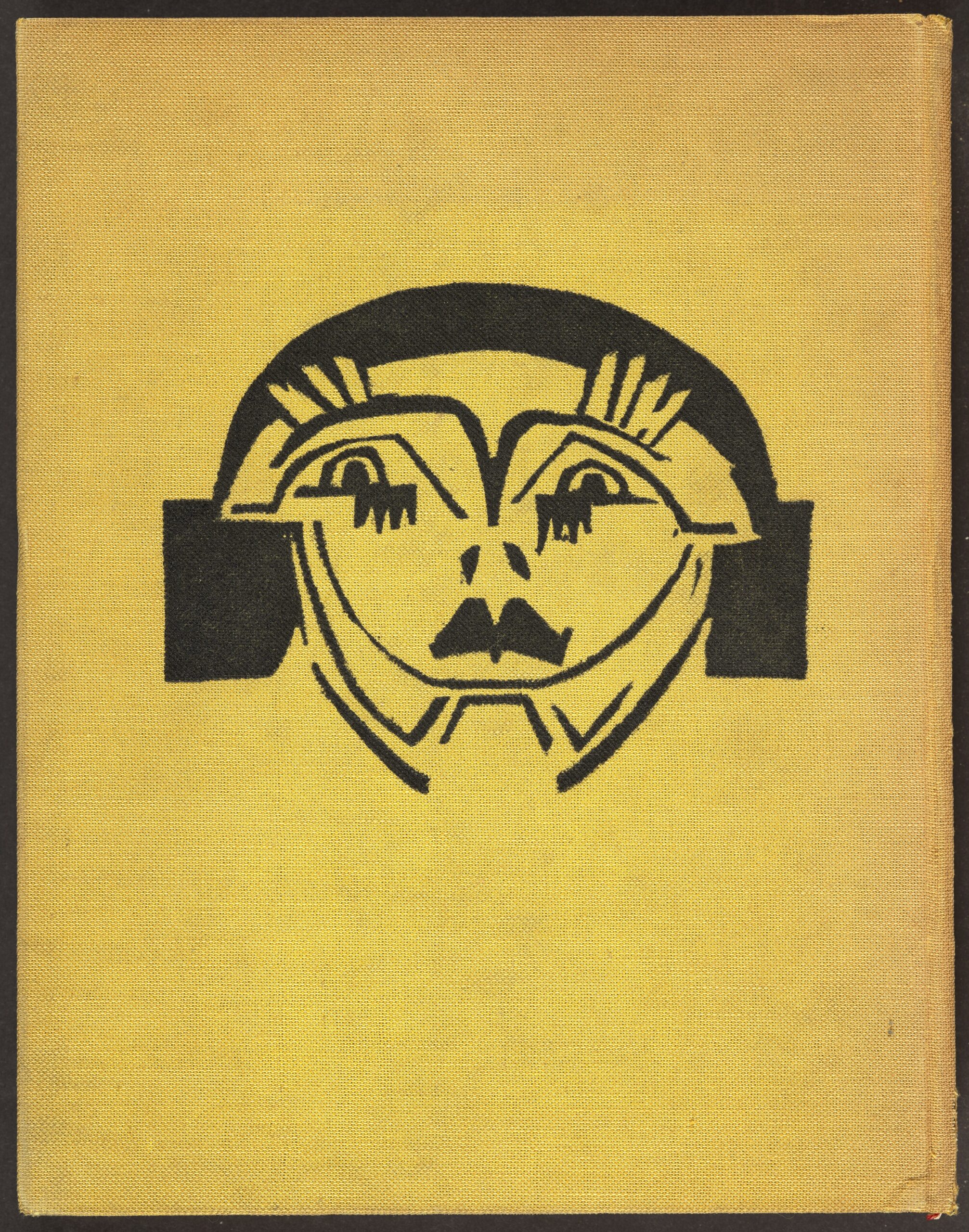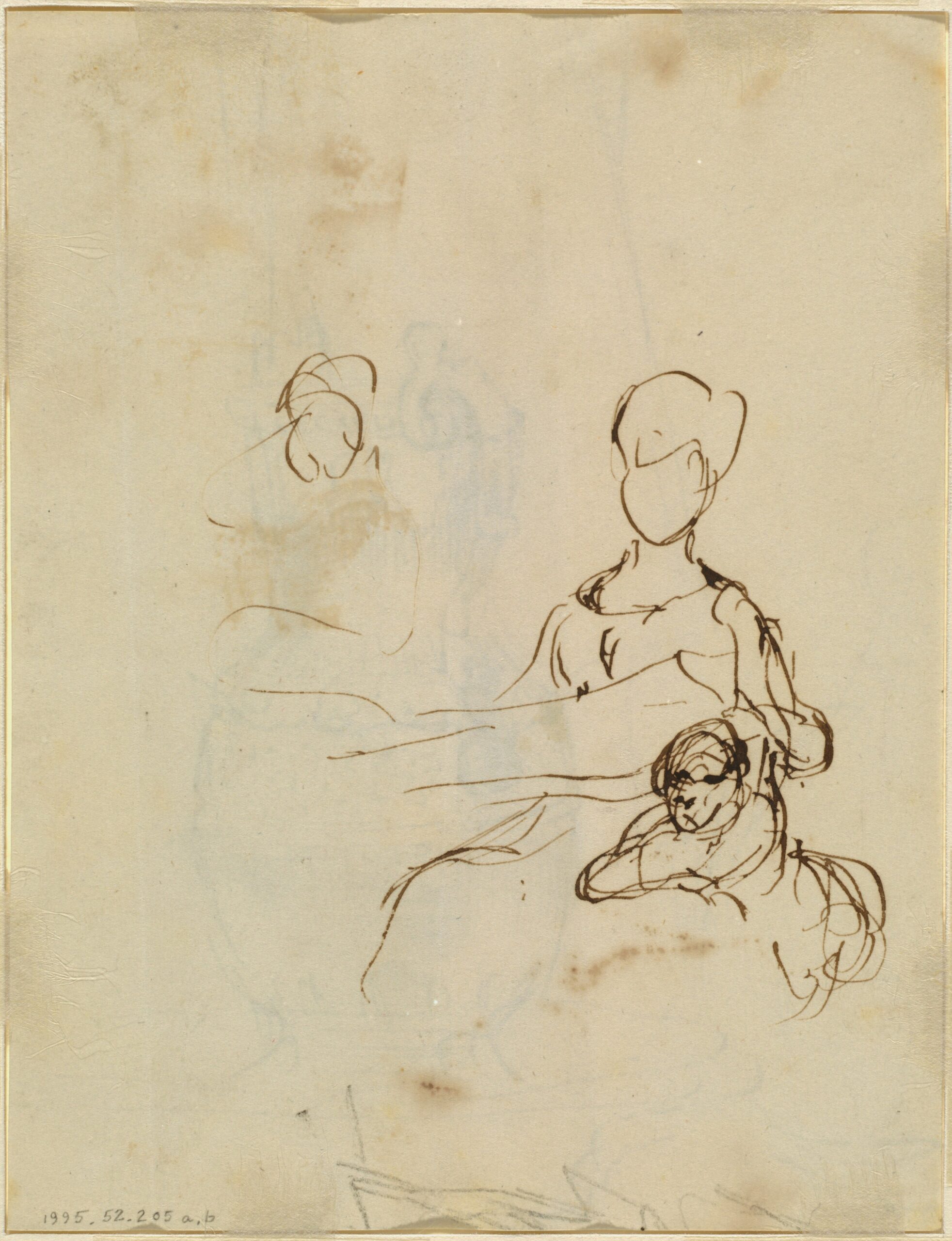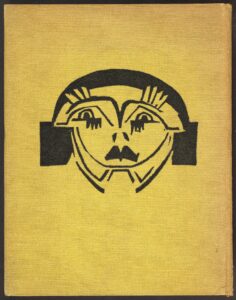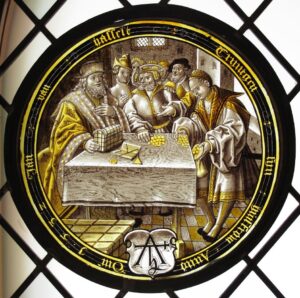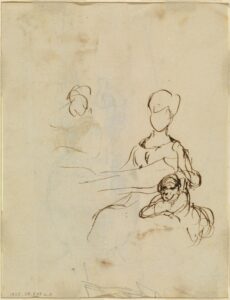Circle of Instruction
Gage Saylor
There are two types of people in this world: Jeopardy people and Wheel people. The Roberts are Jeopardy people. It’s 7:27 p.m. on a Wednesday. Dalton, the Roberts’ only son, is home for Thanksgiving break. A trio of La-Z-Boy recliners sit carefully angled around the entertainment center. It bends from the weight of a boxy tube television, the shelves below and beside it crammed with VHS tapes of action, sport, and Bond films.
Brenda Roberts, the matriarch, is fully reclined, her feet on ice after a shift slinging perfume at the mall. She bobs in and out of sleep, a rum and Coke nestled between her hip and the armrest.
Carl Roberts, the father, is half-reclined, his feet raised but not raised high enough to obscure the television. He has a direct line of sight. The room is arranged to suit his vantage point.
Dalton Roberts, the son, sits forward on the recliner, afraid that he may sink into the ratty, dog-chewed cushions, never to escape.
On mute, Pat Sajak and Vanna White wave their goodbyes as they’re relegated to a small box in the corner. The credits and co-sponsors, terms and conditions, flash across the screen. Carl picks up the remote and nothing happens. He taps the battery panel like he’s burping a ketchup bottle. The Jeopardy theme song triumphantly blasts to life.
Father and son, Carl and Dalton, lick their lips. Brenda snores in a light, revving tenor. This Jeopardy showdown is mythic. A struggle of two forces met so often in opposition that they’re irrevocably bound together.
Dalton would consider the Jeopardy showdown to be a tragic affair, in the Greek sense, an Oedipal situation. The only difference: he would not like to marry his mother. He would, however, like her to stop snoring.
Carl would consider it biblical, a half-remembering of the parable of the prodigal son. The only difference here is that he will not accept his son upon return. Instead, he will beat Dalton’s ass in Jeopardy.
Brenda would think nothing of it, would consider this quality time, would think that boys will be boys. The simple act of reclining after another ten-hour workday is enough for her. Until Carl lost his job, Brenda hadn’t ever worked, not if she didn’t count her high school summers as a lifeguard. All of a sudden, almost four years ago now, it was thrust upon her, and she climbed her way up to floor manager of Macy’s Beauty Services at the Oglethorpe Mall. Even with the tension between Carl and Dalton, like two stones being struck together, Brenda feels at peace. Her family is together again.
Carl takes a sip from his drink, his hands a touch unsteady. The Diet Coke and Wild Turkey sloshes over the rim. Rex, their gassy basset hound, is nestled beneath the recliner, and he lifts his head to shake off the damp.
“Psh,” Carl grumbles to himself, the words spoken into his cup as he’s about to sip again. “Forgot it’s the College Championship.”
“It’s still Jeopardy,” Dalton replies. He grips the open wound of the recliner’s arm and fingers the stuffing.
“Well, you’re the college boy. Don’t let us down now.”
“And you were too good for college,” Dalton says. “So we’ll see how you do.”
Carl glares.
Dalton knows that he shouldn’t lash back with the same wit his father instilled in him, though he isn’t certain why. He has taken the parts of his father that he likes, the street-savvy wit, the toughness, and melded it with a formal education, an investment in the mind rather than the body.
The announcer introduces the contestants, Ivy Leaguers with triple majors. Dalton is at a state college as a B- psych major.
“I don’t like him without the ‘stache. He looks naked.”
“He shaved it two years ago, Dad.”
“Still, you know I’m right.”
The first round of Jeopardy is about to begin.
Dalton takes his head into his hands and cracks his neck, the way assassins do to the unsuspecting in movies. The crack is loud and satisfying. All Thanksgiving break, he has slept in the trophy room, formerly his bedroom, where a red and brown letterman jacket now postures on a spot-lit mannequin torso, where a row of first-place ribbons from an annual rib-eating competition borders the door frame, where a co-ed softball trophy sits encased in plexiglass. There’s no space leftover for a bed, just another refurbished La-Z-Boy where Dalton snatches sleep in two-hour bursts.
Carl cleans up on the Movie Tagline category. He barks out the answers before Dalton can even read the question. Star Wars. Jaws. Indiana Jones. Alex quotes, Carl answers.
Dalton goes four-for-five in the Bach category. “I guess that music history class paid off,” he boasts. Dalton leads at the start of the first commercial break. He lifts himself out of the recliner for a snack.
“And I’ll be stuck with the bill the rest of my life,” Carl says, calling after Dalton with a cupped hand.
Dalton paces the kitchen, on the hunt for something quick. He has lost the instinctual memory of where plates, cups, and food are kept, of where his father stashes the junk food. The kitchen island is crowded with tomorrow’s cans, cranberry sauces and green beans and corn. So much corn. The room is closing in on Dalton. The low ceiling droops in spots from accumulated rain, passed down from the leaking roof that his parents can’t afford to fix. No, the entire house is closing in, far smaller and dirtier and uglier than he remembers it. Dalton reaches above the refrigerator for a bag of Lay’s. He removes the chip clip and stuffs his mouth full of the stale, greasy crumbs. When he’s finished, he abandons the empty bag and leaves the kitchen.
“There’s nothing to eat,” Dalton complains as he settles into his recliner. He looks to his mother.
“Welcome to my life,” Carl says, looking at Brenda too. Carl goes to take a sip but comes up dry. His drink is empty. He holds out his cup and rattles it in Brenda’s direction, the ice cubes tumbling about the bottom.
Brenda twists out of her recliner and sleepwalks to the liquor wall. A practiced bartender, she pours the Wild Turkey 101 in a generous 1-2-3, then cracks open a pair of room-temp Diet Cokes. The clumps of ice turn to pebbles and brush against the rim of the cup, swaying like buoys in a tide. While the drink settles, she checks the brining turkey in the refrigerator, calculating the number of hours until she has to wake up and cook Thanksgiving dinner. Brenda delivers the drink to Carl and returns to her recliner, to her half-sleep.
“How’s your girlfriend?” Carl asks, unable to recall the girl’s name.
“Who, Heather? We broke up,” Dalton replies.
“For the best, probably,” Carl says. “She was an airhead.”
Dalton is inclined to agree. He remembers the incident where Heather used laundry detergent in the dishwasher and flooded his kitchen galley with bubbles and soapy water. He remembers the time she thought Ben Franklin was a president. Or how she’d totaled her car, an entire year of ignoring the check engine light, of ignoring Dalton’s constant reminders. He is about to say all of these things when Jeopardy returns from commercial.
Neither Dalton nor Carl lands a single question in the Barber College category. “Barbers make good money,” Carl says, like there’s still time for his son to change career paths.
Dalton swallows a remark about his father’s lack of potential; that’s not a line he’s prepared to cross. Not yet, at least. His father worked as a prison guard at Coastal State Prison. That is, until they fired him for drinking on shift. His career prospects—a decade of construction, a decade at the prison—limit him now. He’s in his late fifties and the gamble he took in choosing physical labor over education has turned up snake eyes. Too prideful to work at the mall as security, even though Brenda runs the floor at Macy’s and supports his quarter-assed efforts to secure employment.
They split on American History, 3-2 in favor of Carl.
Although there’s no official count, no chicken-scratched legal pad tabulating their scores, there’s a clear sense of who’s ahead. It’s Carl. Narrowly.
Double Jeopardy is about to start.
Perched forward, drawn in toward the screen, Dalton almost slips off the front of the recliner. He steadies himself. His finger taps the gash of exposed cushion like a signaling device. With help from the CliffsNotes on Thomas Hardy category, Dalton breaks ahead.
Carl waits out the Hardy category. His arms are crossed and the drink is a permanent fixture in his hand, like it’s been glued there. His head tilted forward, forming a double chin, he sips and glares at the television, trying to penetrate the glass with his gaze.
There’s a hiccup in the competitive tension during the Female Athletes category. Both Carl and Dalton shrug it off. Who could possibly name female Korean Golfers or biathletes?
Tennessee basketball’s “3 Meeks” were Tamika Catchings, Semeka Randall & her, Alex reads.
The tension is enough to unsettle Rex. He leaves his favorite spot to huddle beneath the kitchen table. Carl shifts around in the recliner and the leg rest squeals like a dying animal, pricks up everyone’s ears.
Dalton looks over at his father and wonders if he’s thinking about it.
Carl looks at his son and then lowers his eyes, wondering if Dalton’s thinking about it too.
They’re thinking about the first and only time that Dalton beat Carl at basketball, beat him at anything, actually. As they both recall the game, they also share in their consternation, thinking briefly that the ordeal was behind them, only for the scab to be ripped away, torn back like a moldy orange peel.
It went like this: years ago, before the mortgage company repossessed Carl’s jet ski, he poured a patch of concrete to extend the driveway. He kept the jet ski there, propped on its trailer and boasting the family’s good fortune. But then, the jet ski was repossessed, the patch of driveway left barren. Carl bought a free-standing basketball hoop from Walmart and painted lines in chalk, an absence he wished to overwrite. The court was small, a simple rectangle abutted by the backyard fence, but it was enough for Carl and Dalton to play one-on-one.
Carl had something of an old man’s game, had meaty, calloused hands that could easily palm a basketball. He’d often hold the ball over Dalton’s head in mockery, a tremor of his past life as a high school bully. Scoop shots, pump-fakes, a feigned injury. Whatever it took to win, Carl did it.
Dalton had sprouted a couple of inches that summer, between his senior year of high school and his freshman year of college. His slender thighs had rounded from branches into trunks, his wingspan extended. Dalton was finally a physical rival for Carl. He was able to dig in on post-ups, put a hand right in his father’s face whenever he shot the ball.
As a custom of paternal dominance, Carl always kept their competitions close. He loved to pull away just before Dalton could succeed. Whenever the family watched a holiday Peanuts special, Carl asked why Charlie Brown even bothered, cheering on Lucy and laughing each time she pulled the football away. That’s the kind of competitor Carl was, no matter the battlefield. Basketball, foot races, Goldeneye even. Carl had a level of skill and control that made him invincible.
The night of Carl’s defeat, they were at ten points each, playing to eleven.
“Next point wins,” Carl said. He passed the basketball to Dalton at the top of the driveway patch. It was supposed to be make-it, take-it. But that was Carl’s ploy, to offer grace, kindness, and then bat it away like Dalton’s next shot.
Dalton was doubled over in his mesh basketball shorts, sweat dripping into his eyes. His breath was shallow. His feet ached in his shoes and he could already feel the blisters forming. Dalton rubbed away the sweat, leaving a streak of dirt across his face.
“I gave you the ball and everything,” Carl said. “Let’s see what you can do with it.”
Dalton bounced the basketball hard at his father’s chest to check it inbounds. Carl bounced it back even harder, the ball slamming into Dalton’s ribcage. The force knocked him backward like a strong wave. But, he managed to save face and catch the ball, his father’s end-of-game taunting averted.
Dalton had so little space with Carl clogging up the middle. He looked to the fence, a few feet to the left of their jerry-rigged basketball court.
Dalton bent his knees like he was about to shoot. He knew his father would expect a final heave of desperation, of luck. Carl’s weight shifted forward. He stretched out an arm toward Dalton, closing in to block the shot. Dalton pump-faked, brought the ball tight against his chest, and bounced it against the fence. With a wide step left around Carl, Dalton caught the ball off the fence, a pass to himself. Carl turned to watch as Dalton rolled the ball off his fingertips. The ball dropped with a careless exclamation, its idle bouncing a throb worse than silence, a heartbeat that slowed and then finally stopped.
“Game,” Dalton said. “Game.”
For days after, they did not speak, not apart from Carl complaining that the fence was out of bounds. But he knew that he’d have done the same thing if he’d thought of it. The kid was just sharper. Three weeks after the basketball defeat, Carl showed up drunk at the prison, continued to drink throughout his shift. He lost his job, has remained unemployed ever since, even after the checks stopped coming in.
Double Jeopardy passes in a blink. They split categories the whole way down.
Berber College
Starts with “R”
All coming down to Final Jeopardy, as it was destined to.
The name of this type of reference book comes from the Greek for “circle of instruction.”
You have thirty seconds, Alex tells them.
The competitive twinkle of the Jeopardy theme song hangs above the room like a low cloud. Dalton and Carl both think, coming to separate conclusions. Before they reveal their answers, they wait for Alex to say time’s up.
“You got it?” Carl asks.
“I think so. How about you, old man?”
“Guess we’ll see.”
At the same time, they say their answers.
Carl says, “Curriculum.”
Dalton says, “Encyclopedia.”
Alex approaches the first contestant. Her answer is scratched out completely. All she wrote was a question mark.
“At least we tried to answer. Sheesh,” Dalton says. He tries to carve away the tension, the fear that he might lose, the fear that he might win.
Alex goes to the second contestant. Curriculum is clumsily scribbled on the screen. Carl readies himself. But no. Alex apologizes. The answer’s incorrect. Carl sinks back into the recliner.
Alex moves to the third contestant. Encyclopedia, Alex says, is the correct answer.
He begins totaling out how much the contestant has won.
Dalton is up on his feet already, hooting and howling. He claps aggressively, his hands pointed in the direction of his father.
“Be a good sport now,” Carl chides.
“I seem to recall a few times that you’ve gloated in the past. You might even say it’s in your curriculum.” Dalton flashes a dagger smile, doubles over laughing.
Carl, flustered, accidentally spills his drink into his lap. Dalton can only laugh harder.
He stands to brush the ice from his stomach, moving with such force that the recliner careens forward and the leg rest snaps shut. “Enough, enough,” Carl says.
“I’m almost done,” Dalton replies, holding up a pleading hand.
This invokes the basketball game for Carl. The moment that Dalton, doubled over, looked well past defeated. Carl wasn’t going to let that happen again.
He shoves Dalton back into the recliner.
“What’s your problem, Dad? Learn to be a gracious loser.”
“You got lucky.”
“I don’t see how knowing the right answer is lucky,” Dalton says. He pulls himself out of the recliner. “I don’t know how bouncing a basketball off the fence is lucky.” Dalton presses his chest against Carl’s chest. “It’s skill, Dad. Skill.”
“You wanna see skill?” Carl asks. He grabs Dalton by the collar of his shirt, picks him up until just the tips of his bare feet touch on the floor. Even though Carl’s not in the shape he used to be, the flare of adrenaline invigorates those old muscles, the muscles he developed from nudging prisoners along the hall, applying a baton to their upper thighs, a place he could hit them without worry over permanent damage.
Dalton punches Carl in the gut, penetrating the fat of his belly and knocking the air out of him. Dalton wraps his arms around his father, and together, they tumble to the floor.
Rex barks from under the kitchen table. He races toward the television, joining in on the brawl as they grapple with each other. Rex bays and howls. He circles Carl and Dalton and nips at their heels.
Dalton manages to weasel out from beneath his father. He stands and puts an elbow into Carl’s back, like something he saw on WWE growing up. The showmanship turns desperate and serious. Grappling turns to scratching. Carl digs his unkempt nails into Dalton’s forearms, draws blood. They’re clobbering at each other until they’re both short for breath, exhausted from a fight without a victor. They’re both uncertain if they have the stamina to continue.
Then, the lull in their brawl is drowned out. Brenda’s snoring intensifies. It’s louder than ever now. Carl and Dalton both look at each other, bleeding, broken down, in disbelief. Not so much that she slept through their fighting, but that wheeze, her droning snore that sounds like a buzzsaw.
God. It’s so annoying.
Dalton stands up and straightens out his college t-shirt. He walks to the kitchen and opens the drawer for loose, forgotten items, of Allen wrenches and koozies and sauce packets. He fishes around, his fingers brushing up against random sharp objects as he digs through the sea of ketchups and honey mustards. He’s looking for anything that’ll do the job. And then he sees the empty bag of Lay’s, crumpled up and defeated on the counter. Right beside the bag is the plastic clip. Dalton returns to the living room to show Carl what he found.
“Perfect,” Carl mouths, flexing the chip clip in his hand. “Perfect.”
They creep over to Brenda’s recliner. They probably don’t have to creep. If she hasn’t woken up before, she won’t now. Still, they gently kneel at each side of the La-Z-Boy, careful not to make a sound.
Together, Carl and Dalton put the chip clip over Brenda’s nose. They muffle their laughter, hands cupped to their mouths. Her clogged snores are like a kinked hose. There’s nowhere for the air to go.
Brenda’s chest lifts from the recliner, and her neck snaps back. She releases the trapped air in a long, heaving gasp.
In this instant, spiraling into panic, Carl projects what will happen if Brenda dies, right here and now. He imagines her funeral, repeating the same three phrases: high school sweetheart, twenty-five years, never find love again. And then, the fear of prison strikes Carl, what they might do to a former guard. He knows what happens in there. He’s seen what’s happened in there. He’s ignored what’s happened in there. If this is really it for Brenda, Carl decides on how to blame Dalton. This was the boy’s idea, he’ll say. Dalton’s the one who found the chip clip. He tried his best to raise the kid, but Dalton’s always been a little unstable. Ask anyone, he’ll say to the police. They’ll tell you.
Dalton is consumed by pity, his mother’s life of so little consequence. To think she’d spent most of her life in this home, taking care of it, and him. She could’ve done anything else with her life but chose not to. He almost reaches the next thought, that maybe she had no choice at all, when he conjures the image of her death, of an understanding police officer, a blanket thrown across Dalton’s shoulders (that would surely sell the story), how all he’d ever known was an abusive household, that, per usual, his father had too much to drink, that he never came home anymore because he feared something like this would happen. It was only a matter of time.
Before they can finalize their alibis, Brenda breathes again. She breathes normally, quietly, through her mouth. There’s a slight whistle in her throat, like a breeze passing through a forest, but it beats the constant lumber mill of before. Carl and Dalton laugh in relief. They leave the chip clip to do its work and keep Brenda silent. They watch a rerun of The Apprentice and imagine a near, quite-possible future when they’re both millionaires.
In the morning, Brenda wakes at dawn to start on the turkey. She returns the chip clip to the junk drawer, her night spent on the recliner. She throws away the empty bag of Lay’s and gets to work.
Dalton and Carl wake at noon, just in time to catch the Lions game. The past is past, they’ve decided; the Father and Son are equals now. They watch the game and drink their beers and blame affirmative action for the female sideline reporter.
When they finally get a good look at Brenda, sitting down for Thanksgiving dinner, they notice the indentations from the chip clip. She rubs the bridge of her nose absent-mindedly.
Brenda picks up the serving bowl of mashed potatoes, part of a dining set that’s been in her family for generations. “You know,” she says. She scoops a heaping portion of mashed potatoes onto Carl’s plate. “I had such a pleasant night of sleep. The first time in ages.”
“Is that right?” Carl asks.
Brenda nods and scoops a dollop onto Dalton’s plate next.
“So did we,” Dalton says, biting the corner of his lip.
Brenda takes a small helping of mashed potatoes for herself. “I’m so glad to hear that,” she says. “Isn’t it nice having the whole family together again?”
Carl and Dalton nod.
Brenda laces her fingers through the handle of a porcelain gravy boat, chipped at the spout but still functional. She pours a sea of gravy onto Dalton and Carl’s plates.
“Wait,” Carl interrupts as Brenda’s about to take her turn. “Aren’t you forgetting someone?”
“Of course,” Brenda says. She gives herself a light, performative bonk on the skull. “How stupid of me.”
Brenda fills a bowl with turkey gravy, tilting the boat until it’s nearly empty. She bends to her side and reaches down to the linoleum floor. Her back pops loudly, creaking like an often-trod staircase. One arm clutching her back in pain, Brenda places the bowl in front of Rex. She nudges the bowl even closer, so that he doesn’t have to move his fat, stubby body.
Carl and Dalton have already started to eat their mashed potatoes, before Brenda can serve the turkey or corn or green bean casserole or cranberry sauce or stuffing or sweet potato casserole with marshmallows. Their eyes are cast down on their food, a protective arm cupped around each of their plates.
In this moment, Brenda finds the resemblance between Carl and Dalton to be uncanny, in both look and mannerism, pausing at the same time to sip their beers, using spoons instead of forks for their mashed potatoes, even slurping their food at the same time. Brenda tilts the gravy boat upside down. She shakes and shakes until the last few drops speckle her helping of mashed potatoes. Then, Brenda begins to serve the corn. They all listen as Rex laps up the gravy, licking his bowl clean.


